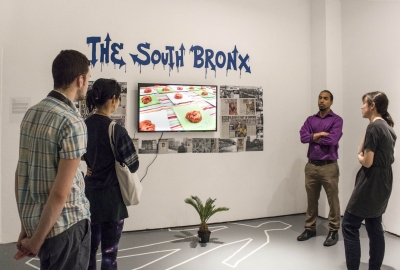
The MA Programs in Art + Education envision a radical space where contemporary art and social justice education meet. We believe that artist educators are cultural workers, researchers, public intellectuals, and activists who help us see ourselves and the world in new ways. Connecting theory to practice, we explore progressive social justice approaches to teaching and artmaking, practice serving as persuasive advocates for the importance of the arts in schools and society, and work towards necessary social change in classrooms and community settings. The following terms are central to our program philosophy and experiences.

Anti-Racism
Defying notions of colorblind education, anti-racist teaching and being insists that we do see color (as it intersects with class, gender and ability) and acknowledge the ways that systemic racism, historic oppression, and ongoing government policies and financial barriers have impacted access to resources and the advancement of people of color in the United States. Anti-racist education means seeing how race continues to impact students of color, and teaching to the humanity of all students in the classroom – enacting curriculum that provides windows and doors into diverse cultures, valuing marginalized knowledge and perspectives, and encouraging critical thinking and questioning about systems of oppression that continue to impact people of color today. See how anti-racist work takes shape in art and education.

Contemporary Art
Contemporary art is the art of today, produced by artists working around the world who are living in our time. Art provides opportunities to reflect on ourselves and our society - considering the issues and ideas that are important to us and seeing the world in new ways. Art reflects timeless concerns such as the complexity of identity, community, and beauty, and also explores timely conversations such as immigration and national boundaries, ecology and environmental sustainability, technology and what it means to be human. Visiting contemporary art exhibitions and talking with artists working today is an important aspect of our program experience and our core value of teaching and learning with the methods and mindsets of artists who create opportunities for critical inquiry, play, experimentation, collaboration, and iterative thinking and making.

Critical Theory
Critical theory is an interdisciplinary field of study that explores ideas that shape cultural practices such as visual art, media, advertising and entertainment. It critically examines the nature of representation, artistic authority and voice. It provides a way of understanding institutions in terms of the ideas they produce and reproduce in our society, which is characterized by the unequal distribution of power. Learn about what inspires us.

Pedagogy
Pedagogy is the art and science of teaching—the how and why we teach and learn with others in formal and informal spaces. Our program explores how pedagogy is situated in particular social political and institutional contexts (public and private schools, community and public spaces, non-profit organizations, and museums), how that site impacts decisions about curriculum, whose knowledge is valued and passed on (and not valued), and what instructional methods best support the educator’s teaching philosophy and the needs of diverse student populations. Learn more about fieldwork and student teaching experiences.

Critical Pedagogy
Critical pedagogy is focused specifically on issues of power in teaching and learning and the world at large. The “critical” in critical pedagogy refers to the ability to be conscious of, analyze, expose and challenge hidden social, cultural and political systems of power. Critical pedagogy asserts that education is never neutral and facilitates educational relationships that are democratic, emancipatory, and transformative for the teacher-as-student and student-as-teacher. Brazilian educator Paulo Freire is considered the ‘grandfather’ of critical pedagogy and his book, Pedagogy of the Oppressed is a key text describing the relationship between the oppressed and the oppressor in educational dynamics and power structures. Additional critical educators include bell hooks, Henry Giroux, Joe Kincheloe and Antonia Darder. See connections between art, education, and social action.

Praxis
Praxis is practice - or action - with the thoughtfulness of reflection. Praxis emerged from the work of Brazilian educator Paulo Freire, who described it as “reflection and action upon the world in order to transform it.” (Pedagogy of the Oppressed, 1972). Praxis embodies our belief that theory and practice in education and art are not binary opposites or separate processes, but rather complements that must work together to further one’s lifelong growth as an artist- educator- researcher- activist. See projects that connect reflection and action.

Social Activism
Social activism addresses social, political, cultural, and economic inequities by organizing community-based movements in order to enact social change. While social services address the needs of individuals, social action examines the root causes of injustice and tries to find ways to organize communities and collaborate across expertise in an effort to address structural inequity and overcome those injustices.The arts offer a powerful set of tools in support of social activism including the power of visualizing, designing, and reimaging the world we want to make. Learn about our artistic activism and flash collectives.
Study Art Education at NYU Steinhardt
Learn more about our community of artist-educators and our commitment to building spaces where contemporary art and social justice education meet.
Art + Education Programs